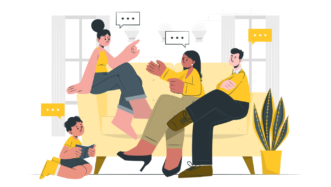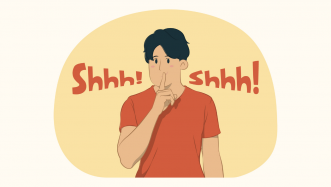Search form
- B1-B2 grammar

Reported speech
Daisy has just had an interview for a summer job.
Instructions
As you watch the video, look at the examples of reported speech. They are in red in the subtitles. Then read the conversation below to learn more. Finally, do the grammar exercises to check you understand, and can use, reported speech correctly.
Sophie: Mmm, it’s so nice to be chilling out at home after all that running around.
Ollie: Oh, yeah, travelling to glamorous places for a living must be such a drag!
Ollie: Mum, you can be so childish sometimes. Hey, I wonder how Daisy’s getting on in her job interview.
Sophie: Oh, yes, she said she was having it at four o’clock, so it’ll have finished by now. That’ll be her ... yes. Hi, love. How did it go?
Daisy: Well, good I think, but I don’t really know. They said they’d phone later and let me know.
Sophie: What kind of thing did they ask you?
Daisy: They asked if I had any experience with people, so I told them about helping at the school fair and visiting old people at the home, that sort of stuff. But I think they meant work experience.
Sophie: I’m sure what you said was impressive. They can’t expect you to have had much work experience at your age.
Daisy: And then they asked me what acting I had done, so I told them that I’d had a main part in the school play, and I showed them a bit of the video, so that was cool.
Sophie: Great!
Daisy: Oh, and they also asked if I spoke any foreign languages.
Sophie: Languages?
Daisy: Yeah, because I might have to talk to tourists, you know.
Sophie: Oh, right, of course.
Daisy: So that was it really. They showed me the costume I’ll be wearing if I get the job. Sending it over ...
Ollie: Hey, sis, I heard that Brad Pitt started out as a giant chicken too! This could be your big break!
Daisy: Ha, ha, very funny.
Sophie: Take no notice, darling. I’m sure you’ll be a marvellous chicken.
We use reported speech when we want to tell someone what someone said. We usually use a reporting verb (e.g. say, tell, ask, etc.) and then change the tense of what was actually said in direct speech.
So, direct speech is what someone actually says? Like 'I want to know about reported speech'?
Yes, and you report it with a reporting verb.
He said he wanted to know about reported speech.
I said, I want and you changed it to he wanted .
Exactly. Verbs in the present simple change to the past simple; the present continuous changes to the past continuous; the present perfect changes to the past perfect; can changes to could ; will changes to would ; etc.
She said she was having the interview at four o’clock. (Direct speech: ' I’m having the interview at four o’clock.') They said they’d phone later and let me know. (Direct speech: ' We’ll phone later and let you know.')
OK, in that last example, you changed you to me too.
Yes, apart from changing the tense of the verb, you also have to think about changing other things, like pronouns and adverbs of time and place.
'We went yesterday.' > She said they had been the day before. 'I’ll come tomorrow.' > He said he’d come the next day.
I see, but what if you’re reporting something on the same day, like 'We went yesterday'?
Well, then you would leave the time reference as 'yesterday'. You have to use your common sense. For example, if someone is saying something which is true now or always, you wouldn’t change the tense.
'Dogs can’t eat chocolate.' > She said that dogs can’t eat chocolate. 'My hair grows really slowly.' > He told me that his hair grows really slowly.
What about reporting questions?
We often use ask + if/whether , then change the tenses as with statements. In reported questions we don’t use question forms after the reporting verb.
'Do you have any experience working with people?' They asked if I had any experience working with people. 'What acting have you done?' They asked me what acting I had done .
Is there anything else I need to know about reported speech?
One thing that sometimes causes problems is imperative sentences.
You mean like 'Sit down, please' or 'Don’t go!'?
Exactly. Sentences that start with a verb in direct speech need a to + infinitive in reported speech.
She told him to be good. (Direct speech: 'Be good!') He told them not to forget. (Direct speech: 'Please don’t forget.')
OK. Can I also say 'He asked me to sit down'?
Yes. You could say 'He told me to …' or 'He asked me to …' depending on how it was said.
OK, I see. Are there any more reporting verbs?
Yes, there are lots of other reporting verbs like promise , remind , warn , advise , recommend , encourage which you can choose, depending on the situation. But say , tell and ask are the most common.
Great. I understand! My teacher said reported speech was difficult.
And I told you not to worry!
Check your grammar: matching
Check your grammar: error correction, check your grammar: gap fill, worksheets and downloads.
What was the most memorable conversation you had yesterday? Who were you talking to and what did they say to you?

Sign up to our newsletter for LearnEnglish Teens
We will process your data to send you our newsletter and updates based on your consent. You can unsubscribe at any time by clicking the "unsubscribe" link at the bottom of every email. Read our privacy policy for more information.
Topic: Reported speech


Reported speech activities
With this lesson, students practise reported speech in various situations. They report on audio recordings and film clips, use reporting verbs and work on reported questions. Students also play a fun quest game!

You said it was OK (reported speech)
In this reported statements lesson plan, intermediate students watch a video, talk about misunderstandings and learn and practise reported speech.

How does silence make you feel?
In this lesson students discover the power of silence, work on improving their listening skills and focus on reported speech practice.

Movie quotes you should know!
With this worksheet, your students will learn some classic movie quotes, use them to practise reporting verbs and do some fun pairwork activity.

Practise reported speech with Vogue interviews
Use Vogue 73 Qs interviews to teach your students reported speech with our original lesson plan and discover new facts about their favourite celebrities!
Username or Email Address
Remember Me

IMAGES
COMMENTS
172 Reported speech English ESL video lessons. SORT BY. Most popular. TIME PERIOD. All-time. obarisk. Reported speech. The learners should . 1804 uses ... 759 uses. ArianeGarcia. Enola Holmes - Repor. Watch the Enola Holm. 3241 uses. Sofyg. Reported Speech - Pr. To report statements. 1001 uses. Gryzelda1. The Crown - Reported. Students learn ...
A selection of English ESL reported speech: reporting verbs video quizzes. Log in / Register. Worksheets. ... Clear all filters. English ESL Video Lessons. Grammar Topics. Reported speech: Reporting verbs. 19 Reported speech: Reporting verbs English ESL video lessons. SORT BY. Most popular. TIME PERIOD. All-time. Anka55. Sherlock - Sherlock ...
A selection of English ESL reported speech b1 video quizzes. reported speech b1. Worksheets. Powerpoints. Video Lessons. Search. Filters. 106 Reported speech b1 English ESL video lessons. SORT BY. Most popular. TIME PERIOD. All-time. alejandracano. Grammar Practice - R. Students have to cha. 6890 uses. arwasaed. Rapunzel Wins Over M.
Learn all about reported speech or indirect speech!Reported speech or indirect speech is used to report something that someone said in the past.Practice here...
We use reported speech when we say the words of other people. Reported speech is also called indirect speech. 4 important rules to remember when forming the...
Mr. P. will begin the lesson by explaining the two types of speech. He will then delve into each speech by giving examples. Finally, he will explain how dire...
Exactly. Verbs in the present simple change to the past simple; the present continuous changes to the past continuous; the present perfect changes to the past perfect; can changes to could; will changes to would; etc. She said she was having the interview at four o'clock. (Direct speech: 'I'm having the interview at four o'clock.') They said they'd phone later and let me know.
WARM-UP & VIDEO. In the first part of this lesson, students do a warm-up activity.They look at two photos and say what the people might be fighting about. Students also read a definition of the word misunderstanding and hypothesize about the reasons for the misunderstandings in the photos. Then, they watch the video which presents a misunderstanding between two characters of the TV show Friends.
22 Reported speech statements English ESL video lessons. SORT BY. Most popular. TIME PERIOD. All-time. msgchan. Dumbo Trailer - Repo. The main task of thi. 193 uses. paolabrogno. ... Reported speech prac. 21 uses. msgchan. Peppa Pig - Broken W. Reported speech - pe. 278 uses. Kisdobos. The Princess Who Nev. Fifteen sentences ne. 21960 uses.
Reported speech activities Grammar. With this lesson, students practise reported speech in various situations. They report on audio recordings and film clips, use reporting verbs and work on reported questions. Students also play a fun quest game!